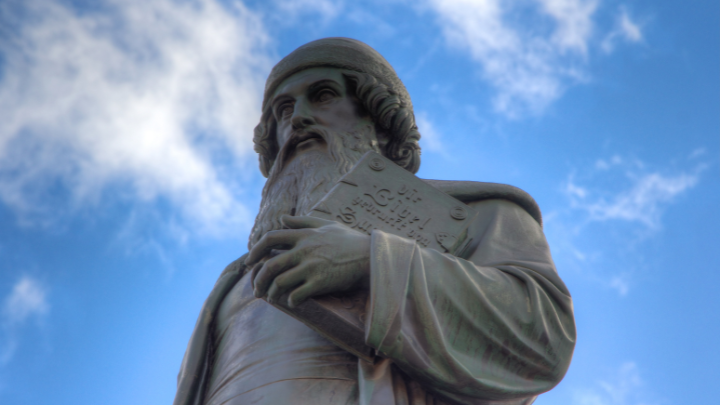
Are You Ready for the Future?
Published in Leadership, Problem Solving, Strategic PlanningHow will we stay ahead of the pack?
On a chilly, overcast February day in Mainz, Germany, a middle-aged inventor wondered to himself if his career had finally taken a promising turn or would continue to remain as bleak as the weather he observed through his workshop window.
Every step forward seemed to be countered by two steps back.
His promise of marriage to a woman from Strasbourg was broken, an event important enough to be registered in court documents.
His skill as a craftsman wrestled with his ambition to become a businessman, but so far the only tangible results he could show were lawsuits from unhappy investors in connection with three separate failed business schemes.
Yet he persisted. He borrowed more money and then borrowed even more, throwing himself into a new project that had shown potential but remained unprofitable.
He had invested more than two years of his life on this new idea, convinced it could work and make money. This project was generating some money, but not enough.
Now he was down to his last few guilders, urgently needing his newest idea using the latest technology to succeed.
It was February 1455 and the inventor was Johannes Gutenberg.
What causes you to continue supporting something that hasn’t delivered the results you expect?
It’s not clear when Gutenberg decided his newest invention—a press using movable type—would focus on printing the Bible.
What’s known is that four or five years before the first one hundred-eighty copies of his forty-two-line Bible came into the world, Gutenberg began experimenting with the metal movable-type printing press. He also reimagined other related practices, including the composition of metal type and the printing process itself.
Gutenberg wasn’t the first to develop printing. The idea of creating a text by reusing individual characters was in use in the Middle East, China and Korea more than two hundred years earlier, but the technology was cumbersome, limiting its widespread adoption.
Gutenberg enjoyed another advantage: Unlike other languages, the small number of alphabetic characters needed for European languages was an important factor that made printing more efficient and, therefore, scalable.
And as a craftsman who had mastered working with gold and other metals, Gutenberg was the first to create his type pieces from an alloy of lead, tin and antimony—materials that remained the standard for more than five hundred years. He also greatly improved the process by treating typesetting and printing as two separate work steps. To accelerate the printing process, he introduced a movable undertable with a flat surface on which the sheets could be changed swiftly.
Thus far, however, these enhancements had done little to guarantee Gutenberg a regular income, much less worldwide fame.
Gutenberg’s printing business was surviving by producing thousands of indulgences for the Catholic church, a practice Martin Luther criticized as the equivalent of clergy selling tickets to heaven for good deeds performed and money donated to the church.
By February 1455, Gutenberg completed what would become his masterwork that would forever bear his name.
In a letter of 12 March 1455, Enea Silvio Piccolomini, later Pope Pius II, wrote to Juan de Carvajal, the cardinal for whom he worked. Piccolomini had held in his hands a Bible of great beauty with such neat lettering that Carvajal would be able to read it without his glasses.
By March 1455, every copy of Gutenberg’s Bible had been sold. Gutenberg’s newest invention was a success.
The high quality and relatively low price of the Gutenberg Bible established the superiority of movable type in Europe. Historians consider the printing press the greatest invention of the Millennium and a key factor fostering the Renaissance as Gutenberg’s process spread rapidly and was adopted worldwide.

What are others already doing that we can do better?
But by November 1455, Gutenberg and his principal investor Johann Fust were at odds, and Gutenberg lost a lawsuit with the result that Fust and Gutenberg ended their cooperation.
Following the foreclosure of the mortgage on Gutenberg’s printing workshop, Fust formed Fust & Schöffer with Peter Schöffer, Gutenberg’s principle workman. Schöffer made money. Gutenberg did not.
In fact, after losing the legal battle with Fust, Gutenberg soon defaulted on debts he’d incurred while inventing his printing press. The inventor of the world’s most powerful technology was bankrupt.
Adding insult to injury, Fust & Schöffer became the first workshop in Europe to publish a book with the printer’s name and date—the Mainz Psalter of August 1457—which heralded the mechanical process by which it had been produced. There was no mention of Gutenberg.
Gutenberg ultimately received a pension from Archbishop von Nassau, but eight years had transpired since being ignored for his invention. He died the following year.
Thirty-six after his death, Gutenberg was mentioned as the inventor of typography in a book by Professor Ivo Wittig. It would be one hundred years following Gutenberg’s death that the first portrait of him appeared in Heinrich Pantaleon’s biography of famous Germans.
Fame is fleeting. Technology is speeding.
Fast forward five hundred years and a different technology disrupted a different German political system as the Voice of America began broadcasting content on 1 February 1942 aimed at areas controlled by the Axis powers.
Fast forward another eighty years to today and artificial intelligence is presenting new advantages and new ethical dilemmas.
Check out this nine-minute video to learn more.
Here are questions today’s leaders must be asking—and answering:
- Where are we falling behind?
- What innovation has delivered the biggest impact to our customers or our organization? How can we build on it?
- What must we do now to stay ahead of the pack?
- What’s our definition of winning big? In what areas are we thinking and playing small?
- What new opportunities related to our core business can we explore?
- How can we get the best ideas from the most people?
As Tom Peters observes in The Circle of Innovation, “If the other guy’s getting better, then you’d better be getting better faster than that other guy’s getting better…or you’re getting worse.”
What’s your next big, bold, inspiring move?
Ready to reset?
Attend my free Accountability webinar: I Did It! to set and achieve your 2021 goals.
- February 17th from 11 AM – 12:30 PM Central Time
- My free webinar will help you:
– Sharpen your personal goals
– Improve time management
– Tackle tough work-related issues
– Support remote workers
Learn More
To dive even deeper into the topic of accountability, I invite you to purchase a copy of my bestselling book, “Accountability: The Key to Driving a High-Performance Culture.”
Become a better leader.
Download my three free e-books.
Free Tips
Sign up to receive free tips on business, leadership, and life.
Get My Latest Book
HOW LEADERS DECIDE
History has much to offer today’s current and aspiring leaders.
Business schools teach case studies. Hollywood blockbusters are inspired by true events.
Exceptional leaders are students of history. Decision-making comes with the territory.



